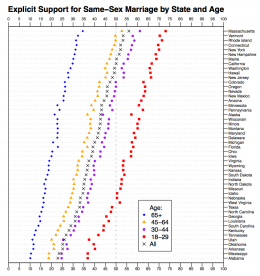Analysis of Polling Data Finds Growing Support for Same-Sex Marriage

(PhysOrg.com) -- According to a comprehensive new analysis of public opinion surveys conducted over the last 15 years, support for the legalization of same-sex marriage has grown substantially in the United States. Among other conclusions, two political science professors at Columbia University found reluctance among state and local policymakers to expand equal rights laws and protections even where majorities of voters support them.
The state-by-state analysis of polling data, titled "Gay Rights in the States: Public Opinion and Policy Responsiveness," tracks trends over time on eight policies affecting gay and lesbian rights: same-sex marriage, civil unions, employment non-discrimination, housing non-discrimination, hate crimes, second-parent adoption, health benefits for same-sex partners and sodomy laws.
The peer-reviewed findings of Jeffrey R. Lax and Justin H. Phillips will be published this August in the American Political Science Review.
“The most important predictor of whether a state has a particular policy protecting the rights of gays and lesbians is public opinion,” said Phillips. “Public support for a policy matters far more than how liberal the voters or government officials are in general. For same-sex marriage, majority support seems sufficient for it to be adopted.”
Lax elaborates on why strong supportive public opinion is critical.
“Majority support for a policy isn’t always enough. You often need supermajority support,” said Lax. “Politicians and policy makers are lagging far behind the public’s support on a number of key gay rights policies that are currently being debated across the U.S., particularly housing and employment protection, but even including civil unions.”
According to the analysis, the growth in support of gay rights is accelerating. Roughly half of the change in support nationwide has occurred in the last four years alone. Majorities now support same-sex marriage inConnecticut, Massachusetts, New Hampshire, New York, Rhode Island and Vermont. Of these, only New York and Rhode Island have not yet legalized same-sex marriage. New York Gov. David A. Paterson, however, has announced his support on the issue and his intention to advocate for legislation this fall.
While support for same-sex marriage is growing in all 50 states, polarization between the so-called red states and blue states is becoming more pronounced. (For the purposes of their analysis, Lax and Phillips define red states as those won by George Bush in the 2000 election for president and blues states as those won by Al Gore).
The difference in support for same-sex marriage between red states and blue states has nearly doubled in the last 12 years. Since 2004, support for same-sex marriage in blue states grew twice as much as in red states—an increase of eight points versus four points. Since 1994, support in blue states increased by 18 points versus 10 points in red states.
“In our analysis of persons 18 to 29 years old, roughly 38 states have majorities explicitly favoring same-sex marriage,” said Lax. “Generational change alone could lead to same-sex marriage rights across most of the country.”
Other findings of the study:
• The more media coverage a policy gets, the more likely it is to match majority public opinion. For example, media coverage of same-sex marriage and civil unions is far greater than coverage of job and housing non-discrimination. This increased visibility leads to increased congruence with opinion majorities.
• Of the 25 states with legislative majorities explicitly favoring civil unions, only 12 allow them. No state has legalized civil unions where majorities oppose them.
• Many states have not adopted housing and employment non-discrimination policies despite the fact that large majorities support them. Only 20 states have adopted such protections.
• Interest groups and voters opposed to marriage equality and other non-discrimination policies have influence far beyond their relative share of a state’s population. They can block equality measures even when there is a significant majority favoring them.
Provided by The Earth Institute at Columbia University (news : web)














